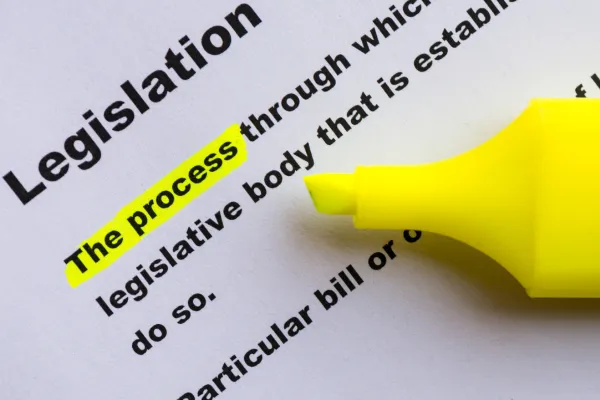Legislation Tracker
When is Statutory Sick Pay paid and what is the current rate?
Statutory Sick Pay (SSP) is paid by an employer to a sick employee for up to 28 weeks. It provides a fixed weekly amount of benefit to the employee and for the tax year 2025/2026 its £118.75 (subject to Lower Earnings Limit of £125)
What details do I need to know as an employer around Statutory Maternity Pay?
Statutory Maternity Pay (SMP) provides eligible employees with up to 39 weeks’ paid leave around the period of childbirth.
The first six weeks are paid at 90% of average earnings; the remaining weeks are at the lower of 90% of earnings and a set rate.
All employees are then entitled to a further 13 weeks of unpaid leave if they have not resumed work.
From 6th April 2025 the rate is £187.18 per week.
As an employer, am I able to claim any help towards the cost of SMP?
Although SMP is administered and paid by employers, as an employer you can recover 92% of the costs from the state through deductions from payments that would otherwise be made to HMRC.
This is done by deducting an amount equivalent to the total amount of gross SMP paid out from National Insurance contributions (NICs) (and, if necessary, income tax), which are sent each month to HMRC.
To reclaim the payments, they should be included in an Employer Payment Summary (EPS) to HMRC.
Small employers who qualify for Small Employer’s Relief, with Class 1 National Insurance liability at or below £45,000 a year, can recover 100% of SMP, plus a further 8.5%.
When is Statutory Paternity Pay paid and what is the current rate?
Statutory Paternity PayStatutory Paternity Pay (SPP) is payable for up to two weeks to employees who meet the qualifying conditions. It is payable at the lower of 90% of the employee’s average weekly earnings and the set rate.
From 6th April 2025 the rate is £187.18 per week.
When is Statutory Adoption Pay paid and what is the current rate?
Statutory Adoption Pay (SAP) is payable to employees who adopt a child, provided that the qualifying conditions are met. SAP provides most employees who adopt a child with up to 39 weeks’ paid leave around the time of adoption. If the child is adopted by a couple, one may claim SAP and the other may claim Statutory Paternity Pay (SPP), or alternatively one or both may claim shared parental pay (ShPP).
SAP is paid at a set rate, or 90% of average weekly earnings if these are less than the set rate of SAP for up to 33 weeks. SAP is paid at a higher rate of 90% of average weekly earnings for the first six weeks.From 6th April 2025 the rate is £187.18 per week.
When is Statutory Parental Bereavement Pay paid and what is the current rate?
Statutory Parental Bereavement Pay (SPBP) is payable for up to two weeks to employees who meet the eligibility criteria, including the loss of a child after 24 weeks of pregnancy up to the age of 18. It is payable at the lower of 90% of the employee’s average weekly earnings and the set rate.
From 6th April 2025 the rate is £187.18 per week.
When is Statutory Neonatal Care Pay paid and what is the current rate?
Statutory Neonatal Care Pay (SNCP) is payable to employees whose child receives neonatal care within 28 days after birth for a minimum of seven days, subject to eligibility conditions. It is payable at the lower of 90% of the employee’s average weekly earnings and the set rate.
From 6th April 2025 the rate is £187.18 per week.
How is Statutory Redundancy Pay calculated?
The amount of redundancy pay depends on the employee’s length of service, subject to a minimum of two years and a maximum of 20 years.
For each year’s service the employee receives a portion of a week’s wages according to their age that year.
All continuous service from age 16 is reckonable.
When under 21, the portion of a week's wage is half
When aged 22 to 40, the portion of a weeks wage is one
When aged 41 and over, the portion of a weeks wage is one and a half
The week’s wages are subject to a statutory maximum amount, depending on when the employee was made redundant. This statutory maximum is now index-linked.
The Maximum Week’s Pay from 6th April 2025 until 5 April 2026 is £719.
In Northern Ireland Increase of Limits - Provision From 20 March 2023 for a maximum amount of a week’s pay is £669.
The Limit on the amount of compensatory award for unfair dismissal is £105,915 and the Daily Rate for Guarantee Pay is £35.
Can you help with the calculation for redundancy pay?
The Redundancy Pay Ready Reckoner for Redundancies from our partners over at BreatheHR will work a treat for you around this:
https://www.breathehr.com/en-gb/resources/redundancy-calculator
What is guaranteed pay and what is the current rate?
An employee is entitled to a guaranteed payment for any day for which they are required to work but for which no work is provided.
The employee is entitled to a maximum of five such payments in any three-month period.
The daily rate is now index-linked.
The Daily Rate for Guarantee Pay from 6 April 2025 until 5 April 2026 is £39.
What are the current national minimum wage rates?
The National Minimum Wage rates are split into five levels depending on age and whether the employee is undergoing a formal apprenticeship.
National Living Wage (25 years and older) rate from 1st April 2020 is £8.72 an hour
Workers aged 23 and over (National Living Wage) from 1st April 2023 is £10.42 an hour
Workers aged 21 and over (National Living Wage) from 1st April 2025 is £12.21 an hour
Main rate (21–24 years only) from 1st April 2020 is £8.20 an hour
Workers aged 21–22 from 1st April 2023 is £10.18 an hour
Development rate (18–20 years only) from 1st April 2025 is £10 an hour
Youth rate (16–17) from 1st April 2025 is £7.55 an hour
Apprentices currently exempt from the NMW (e.g. those under the age of 19 and older apprentices in the first year of apprenticeship) is £7.55 an hour
Accommodation offset — daily from 1st April 2025 is £10.66
Accommodation offset — weekly from 1st April 2025 is £74.62
What are the current Real Living Wage (voluntary rate) rates?
London Living Wage for 2024/25 is £13.85 an hour
Rest of UK Living Wage for 2024/25 is £12.60 an hour
What the awards for unfair dismissal?
Compensation for unfair dismissal comprises up to three elements.
1. Basic awards
The basic award has an upper limit based on redundancy pay. There is a minimum award if the dismissal was automatically unfair.
Minimum limit if automatically unfair from 6 April 2025 until 5 April 2026 is £8763 with the upper limit being £21,570
2. Compensatory award
The compensatory award itself comprises four elements:
- Estimated loss of wages to date of hearing.
- Estimated future loss of earnings.
- Loss of benefits and rights.
- Loss of statutory rights.
Effective 29 July 2013, compensation is the lower of a year’s salary or the figures indicated below.
Compensation remains unlimited in certain types of claim, e.g. discrimination.
From 6 April 2025 until 5 April 2026 limit (or one year’s salary — see above) is £118,223
3. Additional award
The additional award (of between 26 and 52 weeks’ pay) is made if an employer refuses to obey an order to reinstate or re-engage the employee without good reason.
The week’s pay is limited to the same maximum as redundancy pay, which is £719 from April 2025.
What are the awards for failure to allocate and pay tips fairly?
Under the Employment (Allocation of Tips) Act 2023, employment tribunals can award compensation where an employer has failed to allocate and pay tips fairly - from 6 April 2025 until 5 April 2026 the maximum compensation is £5135
Under the Employment (Allocation of Tips) Act 2023, employment tribunals can award compensation where an employer has failed to have a written policy on dealing with qualifying tips, gratuities and service charges, or failure to create a record of how they have been dealt with - from 6 April 2025 until 5 April 2026 the maximum compensation is £5135
What are the injury to feelings compensations awards?
The upper band is reserved for very serious cases, such as where there has been a lengthy campaign of discriminatory harassment.
The middle band applies to serious cases which do not merit an award in the highest band.
The lower band is for less serious cases, such as where the act of discrimination is an isolated or one-off occurrence.
Only in exceptional cases will injury to feelings awards exceed the upper band.
These levels are reviewed annually in March.
Vento bands for claims presented on or after 6 April 2025:
Lower band = £1200 to £12,100
Middle band = £12,100 to £36,400
Upper band = £36,400 to £60,700
When did the Neonatal Care (Leave and Pay) Act 2023 come into force and what does it mean?
This Act came into effect from 6th April 2025 and inserts powers into existing employment legislation to make regulations to create an entitlement to neonatal care leave and pay.
The entitlement applies to eligible employees with a parental or other personal relationship with a child who is receiving, or has received, neonatal care, subject to conditions set out in relevant regulations.
The regulations provide:- a right for employed parents to be absent from work in respect of their child who is receiving, or has received, neonatal care- a right for eligible parents who meet minimum requirements relating to continuity of employment and earnings to be paid during neonatal care leave at a prescribed rate- employment protections for parents taking neonatal care leave that are the same as those associated with other forms of family-related leave (ie maternity, paternity, adoption, parental bereavement and shared parental leave).
Various statutory instruments have passed into law to bring this Act into force, with the new leave and pay entitlements coming into effect for babies born on, or after, 6 April 2025.
When did the National Insurance Contributions (Secondary Class 1 Contributions) Act 2025 come into force and what does it mean?
The Act came into force on 6th April 2025 and with this we saw the increase of the main rate of secondary Class 1 National Insurance contributions (NICs) from 13.8% to 15% and the Class 1A and Class 1B employer rates.
The Act also reduces the Class 1 NICs secondary threshold, from £9100 to £5000 per annum.
These rates are effective until 5th April 2028 and thereafter, the secondary Class 1 NICs threshold will be increased in line with the Consumer Price Index.
To support small businesses with these changes, the Government increased the employment allowance from £5000 to £10,500 and removed the £100,000 threshold, so the allowance is not restricted to employers whose NI bill in the previous tax year was £100,000 or less.
This means eligible employers can reduce their NICs liabilities by up to £10,500 per year.
When did the Worker Protection (Amendment of Equality Act 2010) Act 2023 come into force and what does it mean?
This Act comes into force on 26th October 2024 and places a statutory duty on employers to take reasonable steps to prevent sexual harassment in the workplace. If an employer fails in this duty, the Equality and Human Rights Commission can take enforcement steps and a tribunal can order a compensation uplift of up to 25% of a sexual harassment claim award.
Employers are already liable to take reasonable steps to prevent harassment of their employees, but this Act introduces a standalone duty for employers to take reasonable steps to prevent sexual harassment.
The final version of the Act is different from the original Bill which would have made employers liable for third-party harassment of their employees.
A wider duty on employers to take all reasonable steps was also abandoned during the parliamentary process.
The Equality and Human Rights Commission will update its technical guidance on sexual harassment to reflect the new duty. The guidance, which will be subject to consultation, will set out the steps employers should take to comply with the law.This Act extends to England and Wales and Scotland.
When did the Employment (Allocation of Tips) Act 2023 come into force and what does it mean?
The Employment (Allocation of Tips) Act 2023 came into effect on 1st October 2024, and creates a legal obligation on employers to allocate to workers all tips, gratuities and service charges which they are paid or over which they exercise control or significant influence, without making any deductions.
It requires employers to ensure that the distribution of qualifying tips between workers is fair.
The measures in the Act are supported by a statutory Code of Practice that provides businesses and staff with advice on how tips should be distributed.
The Act also provides:
- a new right for workers to request more information relating to an employer’s tipping record, enabling them to bring forward a credible claim to an employment tribunal
- remedies to be made available to the employment tribunal where employers fail to comply with their obligation, including the ability to order an employer to make a payment to one or more of its workers
- a requirement to provide workers with a written policy on how tips are dealt with, which will apply to any business where tips are paid on more than an occasional and exceptional basis.
Commencement regulations will bring the Code of Practice and the remaining measures in the Employment (Allocation of Tips) Act 2023 into force on 1 October 2024.
What is proposed under the Paternity Leave (Bereavement) Act 2024?
This Act gives fathers and partners a day-one right to take paternity leave where a mother has died.
Currently, maternity leave and adoption leave are day-one rights and do not require any qualifying period of employment, but those taking paternity leave must have worked for their employer for 26 weeks to qualify. This Act makes an exception to the 26-week requirement in cases where the father or partner is bereaved because the mother has died.
Under the Act, the employee will also be permitted to take paternity leave after shared parental leave and the requirement that paternity leave be taken only for specified purposes does not apply in cases where the child also dies.
Those who are adopting a child or becoming parents through surrogacy arrangements have the same rights as fathers and partners where the member of a couple who has elected to take adoption leave dies.
The Act allows the Secretary of State to make regulations with provision for "Keeping in Touch" days, which enable an employee to do some work for their employer during a leave period without bringing the leave period to an end.
The Act does not make provision for bereaved fathers, partners or adopters to receive Statutory Paternity Pay or Statutory Adoption Pay.
The legislation was originally going to provide for a father or partner, bereaved by the death of a mother, to take shared parental leave. However, because shared parental leave is dependent on the parent having access to another form of parental leave whereas paternity leave is not dependent on any other entitlement, paternity leave was chosen as the vehicle to deliver the new entitlement. The intention is that a bereaved father or partner will have 52 weeks of leave available during the first year of their child’s life.
Regulations will be required to bring the Act into force and we don't have a specific date of enforcement at this point
Is there something on the horizon around non-compete clauses?
The Government has announced that it will introduce a statutory limit of three months on the length of post-termination non-compete clauses in employment and limb (b) worker contracts.
Non-compete clauses are restrictive covenants inserted into employment contracts to prevent individuals from working for a competitor or establishing a competing business for a defined period after termination.
Limb (b) workers are in dependent working relationships but are not employees. They are generally required to do the work themselves and only have a limited right to send someone else. They are entitled to core statutory employment rights but are more likely to have casual and flexible working relationships, often involving multiple and sometimes rival employers.
The three-month statutory limit on non-compete clauses will only apply to Great Britain (England, Wales and Scotland) as employment law is devolved to Northern Ireland.
Legislation to introduce the statutory limit will be brought forward when parliamentary time allows.
What is the Employment Rights Bill?
The Employment Rights Bill will update and enhance existing employment rights and make provision for new rights. It will also make provisions regarding pay and conditions in particular sectors and make reforms in relation to trade unions and industrial action. It will further create a new Fair Work Agency that brings together existing bodies for the enforcement of employment law.
The Bill introduces measures to:
- make certain employment rights apply from the first day of employment, including protection from unfair dismissal and entitlement to paternity leave and unpaid parental leave
- establish bereavement leave for all employees (currently it only applies to parents)change the flexible working rules so the employer must give a reasonable explanation to refuse a request
- give workers on zero-hours contracts the right to a guaranteed-hours contract if they work regular hours over a defined period
- abolish fire and re-hire so that it is automatically unfair to dismiss an employee for refusing a contract variation
- strengthen provisions on collective redundancy
- establish the Fair Work Agency to bring together existing enforcement functions
- modernise trade union laws
- improve pay and conditions through a Fair Pay Agreement in adult social care
- re-establish the School Support Staff Negotiating Body
- increase protection from sexual harassment, including introducing employer liability for third-party harassment
- require large employers to produce gender and menopause action plans
- ban dismissal of women who are pregnant, on maternity leave and during a six-month return-to-work period, except in specific circumstances
- remove the waiting period before Statutory Sick Pay can be claimed and remove the lower earnings limit for making a claim
- repeal legislation setting out minimum service levels requirements during strike action.
The Bill provides for the repeal of the Strikes (Minimum Service Levels) legislation to come into effect on Royal Assent. It provides for various clauses related to trades unions and industrial action to come into effect two months later. The rest of the provisions will come into force after regulations are made by the Secretary of State following consultation.
In its policy document, Next Steps to Make Work Pay, the Government says it will begin consulting on these reforms in 2025 and anticipates the majority of them will take effect no earlier than 2026. Reforms of unfair dismissal will take effect no sooner than the autumn of 2026.
What is the Domestic Abuse (Safe Leave) Bill?
This Bill puts forward proposals for a new right to 10 days paid safe leave for people experiencing domestic abuse, to address issues related to that abuse. These issues could include, e.g. finding a place of safety, dealing with health or housing issues, childcare, attending court or police interviews, attending counselling, etc.
This Bill is currently progressing through Parliament.
What is the Office of the Whistleblower Bill?
This Bill proposes to establish an independent Office of the Whistleblower to protect whistleblowers and whistleblowing.
Under the current measures in the Bill, the Office of the Whistleblower will:- set, monitor and enforce standards for the management of whistleblowing cases- provide disclosure and advice services- direct whistleblowing investigations- order redress of detriment suffered by whistleblowers.
The proposed office would aim to provide employees and individuals with greater protections and backing when speaking out against organisations, particularly larger ones.
By having this office in place, the Bill also proposes that it will be a designated body to which people can report when they have made a disclosure.
A similar Bill was put before Parliament in the previous parliamentary session, but progress on this was lost when Parliament was dissolved ahead of the general election in July 2024.
Are there any plans to change
Yes under Health and Safety at Work, etc Act 1974 (Amendment) Bill, if passed into law, this Bill will amend the Health and Safety at Work, etc Act 1974 to place new requirements on employers as follows:
- to take proactive measures to prevent violence and harassment in the workplace
- to make provision for protections for women and girls in the workplace
- to require the Health and Safety Executive to publish a Health and Safety Framework on violence and harassment in the workplace, including violence against women and girls in the workplace.
Effectively, this Bill will expand employers’ health and safety duties to include prevention of workplace harassment, adding to employers’ existing proactive duty to prevent sexual harassment at work.
Under the provisions of this Bill, employers that fail in their positive duty to prevent sexual harassment could face enforcement action by the Health & Safety Executive, which could include criminal liability and unlimited fines.



